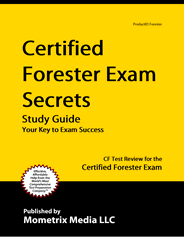Certified Forestor Certification Examination CF Test preparation Study Guide
The Certified Forester (CF) certification is a prestigious credential that demonstrates a professional's expertise and commitment to sustainable forest management. This certification is offered by the Society of American Foresters (SAF), which aims to advance the science, education, technology, and practice of forestry. For those aspiring to earn this certification, understanding the exam's eligibility, syllabus, and format is crucial for effective preparation. This guide will provide a comprehensive overview of these aspects to aid candidates in their journey towards becoming a Certified Forester.
Eligibility
To be eligible for the Certified Forester examination, candidates must meet specific educational and professional criteria as outlined by the Society of American Foresters. The primary eligibility requirements include:
- Educational Background: Candidates must possess a bachelor's degree or higher in forestry or a related field from an accredited institution. The degree should include coursework in core forestry subjects such as silviculture, forest ecology, and forest management.
- Professional Experience: A minimum of five years of professional forestry experience is required. This experience should demonstrate the candidate's ability to apply forestry principles and practices in real-world scenarios.
- Adherence to Ethical Standards: Candidates must agree to abide by the SAF Code of Ethics, which outlines the professional and ethical standards expected of Certified Foresters.
Meeting these criteria ensures that candidates have the foundational knowledge and practical experience necessary to succeed in the examination and uphold the standards of the profession.
Syllabus
The Certified Forester examination covers a broad range of topics that reflect the diverse knowledge and skills required in the field of forestry. The syllabus is designed to test candidates on their understanding of both theoretical concepts and practical applications. Key areas of the syllabus include:
- Forest Ecology and Biology: This section focuses on the principles of forest ecosystems, including the interactions between different species, forest succession, and the impact of environmental factors on forest health.
- Silviculture: Candidates are tested on their knowledge of silvicultural systems, techniques for managing forest regeneration, growth, and quality, as well as the application of these techniques to achieve specific management objectives.
- Forest Management: This area assesses candidates' ability to develop and implement forest management plans, including inventory methods, growth and yield modeling, and the integration of economic, social, and environmental considerations.
- Forest Policy and Economics: Understanding the economic principles and policy frameworks that influence forestry practices is critical. This section covers topics such as timber markets, valuation, and the impact of legislation on forest management.
- Forest Protection: Candidates must demonstrate knowledge of strategies for protecting forests from pests, diseases, fire, and other threats, including the use of integrated pest management and fire management techniques.
- Measurement and Inventory: Proficiency in forest measurement techniques, data collection, and inventory analysis is essential. This section tests candidates on their ability to accurately assess forest resources.
- Urban and Community Forestry: As urban forests play a crucial role in enhancing the quality of life in urban areas, candidates need to understand the principles of urban forestry, including tree selection, planting, and maintenance.
The syllabus is comprehensive and requires candidates to have a well-rounded understanding of forestry principles and practices. It is advisable for candidates to review the SAF's recommended reading materials and resources to ensure thorough preparation.
Format of the Exam
The Certified Forester examination is designed to assess a candidate's knowledge, analytical skills, and ability to apply forestry concepts in various scenarios. The exam format includes multiple-choice questions, short answer questions, and case studies. Here is a detailed breakdown of the exam format:
- Multiple-Choice Questions: This section consists of questions that test candidates on their understanding of fundamental forestry concepts. Candidates must select the most appropriate answer from a list of options. This section evaluates the candidate's breadth of knowledge across the syllabus topics.
- Short Answer Questions: Candidates are required to provide concise responses to questions that assess their ability to apply theoretical knowledge to practical situations. This section tests the candidate's depth of understanding and problem-solving skills.
- Case Studies: The case study section presents candidates with real-world forestry scenarios. Candidates must analyze the situation, identify key issues, and propose solutions based on their knowledge and experience. This section evaluates the candidate's ability to integrate and apply their knowledge in complex situations.
The exam is typically administered in a computer-based format at designated testing centers. Candidates are given a specific amount of time to complete each section, and time management is crucial to ensure that all questions are addressed. The Society of American Foresters provides candidates with detailed instructions and guidelines on the examination process, including information on registration, scheduling, and exam day procedures.
Conclusion
Preparing for the Certified Forester examination requires a comprehensive understanding of the eligibility criteria, syllabus, and exam format. Candidates should focus on building a strong foundation in forestry principles and practices, as well as honing their analytical and problem-solving skills. Utilizing the resources provided by the Society of American Foresters, including recommended reading materials and study guides, can significantly enhance a candidate's preparation. Successfully passing the Certified Forester examination not only validates a professional's expertise but also opens doors to advanced career opportunities in the field of forestry. As stewards of the environment, Certified Foresters play a critical role in promoting sustainable forest management and ensuring the health and vitality of our forests for future generations.
Study Guide and Preparation for the Certified Forester Certification Examination CF
A Complete Certified Forester Certification Examination study guide that includes sample questions, test tips and a complete study plan prepared by a team of expert and dedicated researchers. Cost-effective and qualified exam help from a committed exam preparation company.
Click here to order Certified Forester Exam Secrets (printed book)
Click here to order Certified Forester Exam Secrets (ebook download)
Certified Forester Exam Flashcard Study System
How to Prepare for Multiple Choice Questions
Tips and tricks that can help you prepare for multiple choice questions and increase your mark. Prepared by professionals these tricks help you excel in Certified Forester multiple choice exam.


